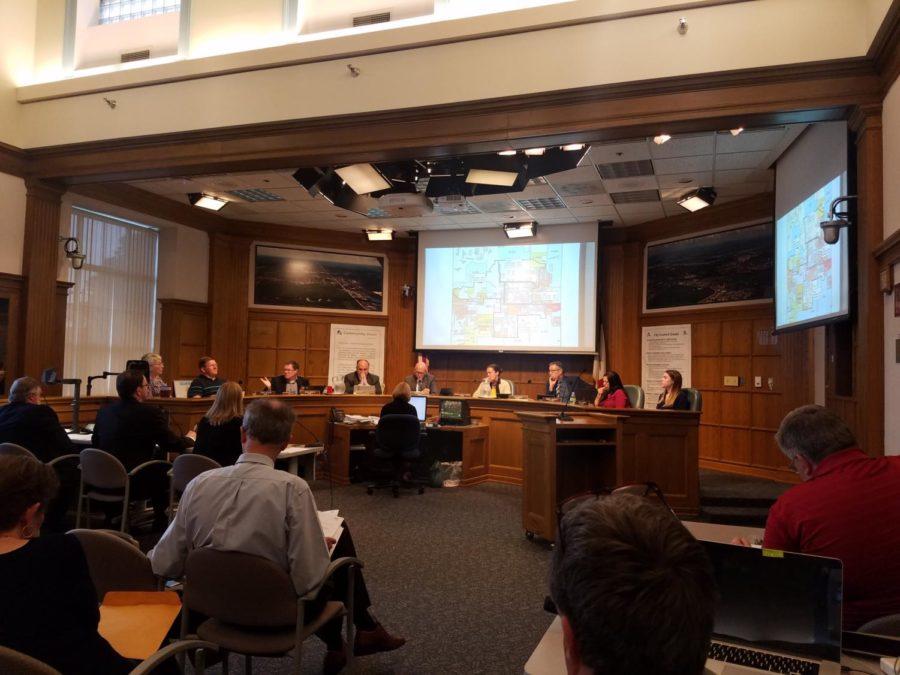- App Content
- App Content / News
- News
- News / Politics And Administration
- News / Politics And Administration / City
City Council pushes talks for zoning changes and rental cap “hardship exemptions”
June 12, 2018
Members of the Ames community gave their arguments for and against varying issues discussed at Tuesday’s city council meeting.
The June 12 meeting focused on preliminary discussions over rental cap exemptions which attempt to alleviate financial hardships caused by the recently passed rental cap and the passage of zoning laws along Lincoln way.
The rental cap, which was passed on May 22, limits the number of rental homes in neighborhoods near campus to 25 percent while allowing new rentals to emerge if the property owner has a letter of compliance, or LoC.
During the period of time in which city council decided on the rental cap, a moratorium on all new LoC’s was established to prevent a large influx of new rental properties.
At the meeting, multiple people spoke against the way the moratorium was implemented including Ames residents Mary Conroy and Morgan Johnston.
“A significant amount of people in Ames had no idea about the moratorium, or about the cap,” Conroy said.
Johnston felt it was unfair to change how property owners could utilize their property.
“I would like to use my property for the same things as when I bought it,” Johnston said.
Johnston said the best remedy the council could consider would be to implement option three of three considerations at the council meeting.
These options were established at the May 22 meeting and would allow exemptions for homeowners to acquire LoC’s.
Option one and two were similar, as they require a homeowner face financial hardship, defined by how long their home had been on market, before being allowed an LoC. Option one sets the number at two years while option two requires nine months.
Option two requires the home in question be surrounded by rental homes on three sides, or two sides in cases of “unusual geography.”
Option three allows any home to get an LoC within the next six months but home owners that do not use their renting capabilities within a year of getting their LoC will lose it.
Opponents of option three said it was too broad and forgiving, while supporters said it was needed to remedy mismanaged communications.
Ames resident Kate Gohr said her parents bought her a house within one of the neighborhoods near campus as she had health issues that made apartment living impossible. Now that she is nearing her graduation, Gohr says she was looking to get an LoC and rent out her home.
When the city recommended she hold off from getting the LoC until her plans had been finalized, Gohr says she had been unaware of any talks of a rental cap.
“The city told me not to get an LoC,” Gohr said. “Then one day I get a letter in the mail about the moratorium: when we had the inspection done, we were told we could no longer get the LoC because our neighborhood was at 30 percent. We are essentially stuck.”
Gohr and others who had similar stories say it is an unfair financial burden on low income or struggling families.
To this, opponents of option three, like Ames resident Pat Bown, said it was not the job of government to ensure a sound investment.
Councilwoman Gloria Betcher of Ward One agreed with Bown.
“I am not concerned with people protecting their investments and letting them do what they want with their homes,” Betcher said. “I am concerned with the neighborhood.”
At-large representative Amber Corrieri disagreed with Bown and Betcher.
“The government has an obligation to mitigate harms to the people when the government is the one deliberately trying to harm them,” Corrieri said.
Ward Three representative David Martin motioned to exclude the third option from consideration, but the motion failed on a 2-4 vote. Martin and Betcher were the two in favor of getting rid of option three.
Mayor John Haila chimed in after the vote saying option three undermined the idea of the rental cap to begin with, and could mean the council is moving backwards on the cap.
Ward Two representative Tim Gartin agreed with Haila, but said compromises needed to be made and people should be protected.
“John is right, it isn’t consistent, but it is part of the balance,” Gartin said.
By the end of the discussion, the council had made fine changes to options one and three noting they would have their first readings at the June 26 meeting.
The council also had the third reading of zoning laws in the stretch of Lincoln Way near where it intersects with Duff avenue.
After a short discussion and decision to allow for the grandfathering in of older buildings in the zoning changes, the council decided to table the talks for the June 26 meeting when all business owners will have had time to familiarize themselves with the laws and lawyers could be present.
The next meeting will have the final passage of the zoning changes.
















